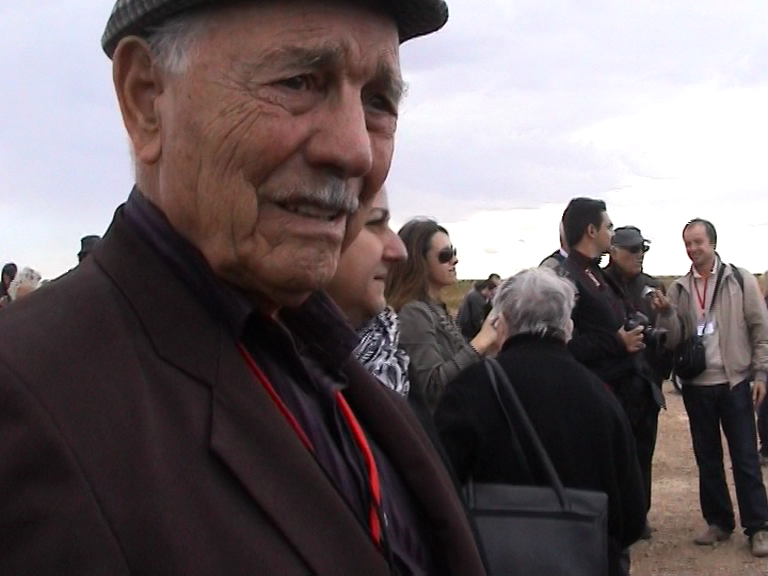Reportage
Joseph Almudéver, the last International Brigadesman, died at 101
Speaking with Joseph about the Spanish Civil War was a fully immersive experience. He remembered dates and places with astonishing accuracy. He spoke incessantly, like someone who is aware that he doesn't have much time left and doesn't want his memories to be lost.

We can’t know what his last thought was before he closed his eyes for the last time, but it’s almost certain that he must have said to himself: “I was in the International Brigades.” On May 23, 2021, Joseph Almudéver passed away, the last man on this planet who could boast of that.
For him, this was a source of great pride, and perhaps his only consolation for the war that was tragically lost. On July 18, 1936, when General Francisco Franco enacted his coup against the Spanish Republic, triggering the civil war, Joseph was just a boy, not yet 17 years old. In order to enlist in the Republican army, he had to lie about his age and join as a volunteer, as he was a French citizen by birth, and he managed to do so even before his brother Vincent, who is a couple of years older (and still alive).
After a break due to an injury, Joseph returned to the front and chose to enlist in the Carlo Rosselli unit that had the Italian Lino Marega as its political commissar—and thus he became a member of the 129th International Brigade.
Between 1936 and 1939, about 50,000 people from over fifty countries joined these military units as volunteers. They represented the first and strongest support of the Republican army, helping it for three years to face the stronger Francoist forces, who had military support from Hitler and Mussolini. The history of the International Brigades continued the romantic tradition of heroes embracing the causes of oppressed peoples, and belonged to the broader arc of which Garibaldi’s enterprise had been a part.
Although they were organized by the Comintern and most of their members were communists—as Joseph himself was until the end of his days—they also counted among their members exponents of other political cultures, from socialists to republicans, also including liberals and lone adventurers. Their work as part of the Republican front was inevitably affected by the difficult relationship with the anarcho-libertarian culture, which was very strong in Spain, and by Stalin’s obsessions, but their organizational and military effectiveness gave hope to the Republican forces and was the highest level of response against the fascist threat. Their deeds have been recounted and made legendary by the stories of Hemingway, by the photographs of Robert Capa, Gerda Taro and Chim, by the poems of Auden, Cornford and Hikmet, by the films made by Ivens, Bresson, Buñuel, Dos Passos and Orson Welles.
For me, speaking with Joseph about the Spanish Civil War was a fully immersive experience. He remembered dates and places with astonishing accuracy. He spoke incessantly, like someone who is aware that he doesn’t have much time left and doesn’t want his memories to be lost. As he recounted, he was still indignant against the Western democracies, which failed to help Spain; he still hated Franco, he was moved by the memory of his dead comrades, and he stood by his courageous choices. But it was his behavior at the end of the war that illustrated what humans are truly made of.
It was January 1939—the war was now clearly lost, and those who could were seeking refuge in France. After being welcomed in Barcelona by the head of the Republican government, Juan Negrin, Joseph managed to escape to France on January 20. But after a few days in Marseille, he was overcome by a deep sense of unease, and he took the mad decision to board a British ship which would bring him back to Spain on February 5, to Valencia, just in time to witness the final collapse of the Republic.
That would come after he suffered a final indignity that would mark him for life. This took place on March 30, 1939, the last day of the Republic. He and his family were at the port of Alicante, trying to board a ship and save themselves, as Franco’s troops were already surrounding the port—with the Italian fascist militias among them, harassing the desperate Spaniards.
There was a moment when Joseph realized that they would not be able to embark, and to avoid being recognized as a member of the International Brigades, he decided to throw his Brigade membership card into the water. As he retold the story, more than 80 years after the events, he still had tears in his eyes. Joseph’s story made me understand that it’s only when the game is over that you understand what kind of player you’re dealing with. He was a fighter with his whole being, a man unable to give up because he doesn’t know how to surrender, because it’s not right to surrender to oppression.
He was a true “International Brigadesman.” The last one. And after many, many years, whenever people still talk about the International Brigades, let his name be remembered: Joseph Almudéver. He has earned it.
The memoirs of Joseph Almudéver were published in Italy in 2017 by Edizioni Ets as part of the “Verba manent” series (in the translation of Ángeles Aguado López), with the title La Repubblica tradita. Memoria di un miliziano e brigatista internazionale alla Guerra di Spagna (“The Betrayed Republic: Memoir of an International Militiaman and Brigadesman in the Spanish Civil War”).
Originally published at https://ilmanifesto.it/joseph-almudever-lultimo-volontario/ on 2021-05-30
